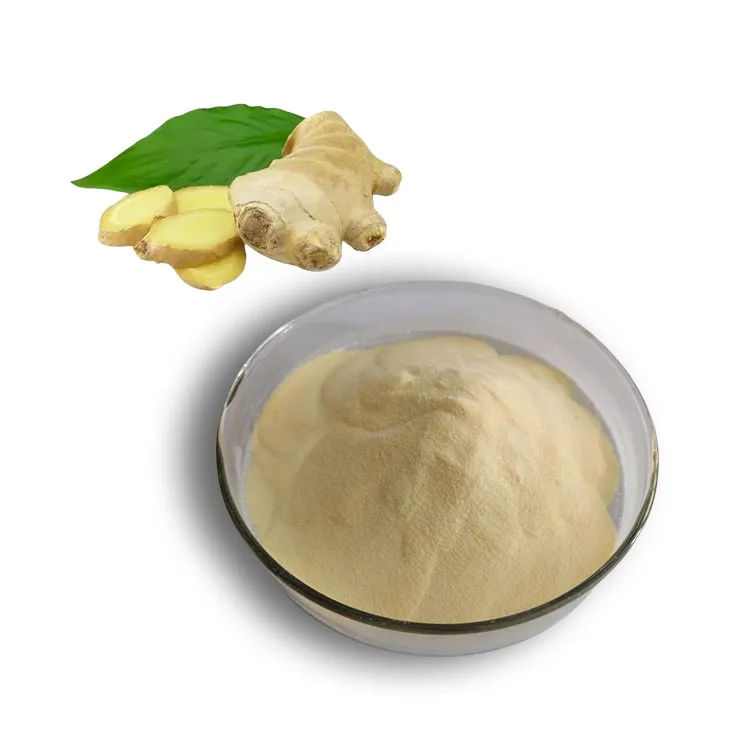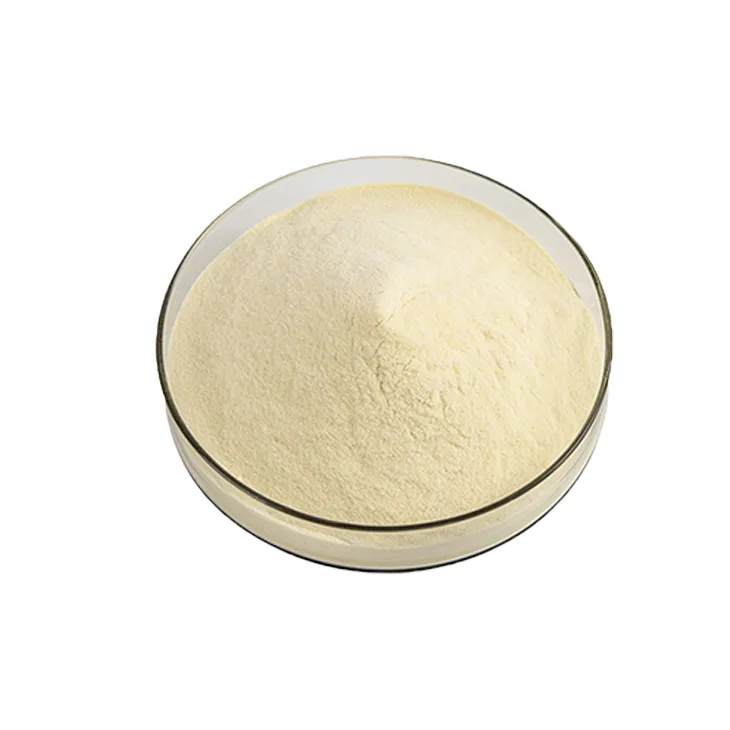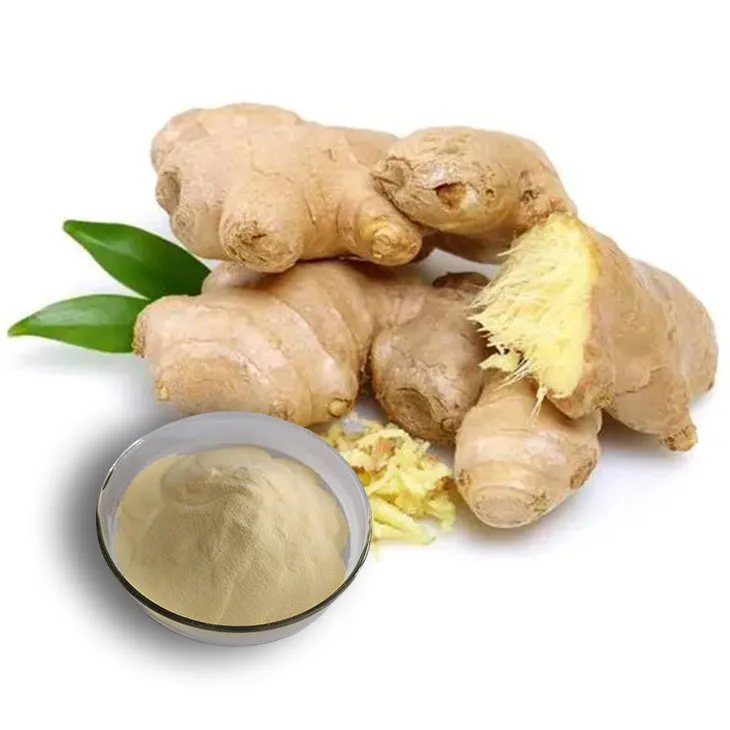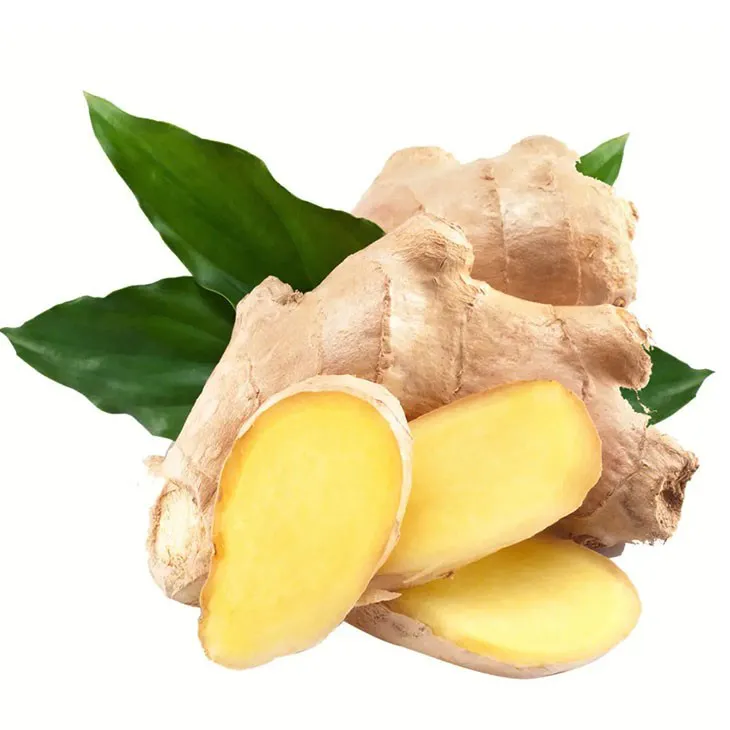- 0086-571-85302990
- sales@greenskybio.com
The Best Types of Ginger Extract: A Guide to Selecting the Best Ginger Extract
2024-11-13

Introduction
Ginger has been a staple in traditional medicine and cooking for centuries. Its unique flavor and numerous health benefits have made it a popular ingredient worldwide. Ginger Extract, in particular, has gained significant attention in recent years due to its concentrated form and potential for various applications. However, with different types of Ginger Extracts available in the market, it can be quite challenging to choose the best one. This article aims to provide a comprehensive guide on selecting the best Ginger Extract, taking into account factors such as origin, manufacturing process, and effectiveness.

1. Understanding Ginger Extract
Ginger extract is a concentrated form of ginger that contains the active compounds found in the ginger root. These active compounds, such as gingerols and shogaols, are responsible for ginger's characteristic flavor and many of its health - promoting properties. The extraction process typically involves separating these compounds from the raw ginger root, resulting in a more potent and versatile product.

2. Types of Ginger Extract
2.1 Organic Ginger Extract
Origin: Organic ginger extract is derived from ginger plants that are grown without the use of synthetic pesticides, fertilizers, or genetically modified organisms (GMOs). The ginger is usually sourced from organic farms that follow strict environmental and agricultural standards. These farms often use natural methods such as composting, crop rotation, and biological pest control to ensure the healthy growth of ginger plants.
Manufacturing Process: The manufacturing process of organic ginger extract also adheres to organic standards. This means that no artificial solvents or additives are used during extraction. Instead, methods like steam distillation or cold - pressing are commonly employed to obtain the extract while preserving its natural properties.
Effectiveness: Organic ginger extract is considered to be highly effective, especially for those who prefer a more natural and pure form of ginger extract. It retains a high concentration of the beneficial gingerols and shogaols, which can help with digestion, reduce inflammation, and boost the immune system. For example, many people use organic ginger extract to relieve nausea, whether it's due to motion sickness, pregnancy, or other causes.
2.2 Non - Organic Ginger Extract
Origin: Non - organic ginger extract comes from ginger plants that may be grown using conventional farming methods. This includes the use of synthetic pesticides and fertilizers to increase yield and protect the crop from pests and diseases. The ginger can be sourced from a wide range of regions, both domestic and international, depending on the availability and cost.
Manufacturing Process: In the manufacturing of non - organic ginger extract, a variety of extraction methods can be used. Some manufacturers may use solvents like ethanol to extract the active compounds more efficiently. While these solvents are generally considered safe in small amounts, they may leave some residue in the final product. However, modern manufacturing techniques are designed to minimize such residues.
Effectiveness: Non - organic ginger extract can still be effective in providing the health benefits associated with ginger. It contains the same active compounds as organic ginger extract, although the concentration may vary depending on the quality of the raw ginger and the extraction process. For instance, it can also be used for its anti - inflammatory properties in treating conditions like arthritis.
2.3 Specialized Ginger Extracts
High - Potency Ginger Extract:
- Origin: These extracts are often made from high - quality ginger roots that are carefully selected for their high content of active compounds. The ginger may be sourced from regions known for producing potent ginger, such as India or China.
- Manufacturing Process: Specialized extraction methods are used to create a high - potency extract. This may involve multiple extraction steps or the use of advanced technologies to concentrate the gingerols and shogaols to a higher level than in regular extracts.
- Effectiveness: High - potency ginger extract is designed for those who want a more intense effect. It can be very effective in reducing severe pain and inflammation, for example, in cases of chronic back pain or sports - related injuries.
Standardized Ginger Extract:
- Origin: The ginger used in standardized ginger extract can come from various sources, but the key is that the final product is standardized to a specific level of active compounds. This ensures consistency in its effectiveness.
- Manufacturing Process: During the manufacturing process, strict quality control measures are implemented to achieve the desired standardization. This may involve testing the raw ginger for its active compound content and adjusting the extraction process accordingly.
- Effectiveness: Standardized ginger extract is popular in the supplement industry as it provides a reliable and consistent dose of ginger's active ingredients. It is often used in clinical studies due to its consistent composition, making it easier to evaluate its effectiveness in treating various conditions such as gastrointestinal disorders.

3. Factors to Consider When Selecting Ginger Extract
3.1 Quality of the Raw Ginger
The quality of the raw ginger used in the extract is crucial. Ginger that is fresh, mature, and free from mold or damage will generally produce a higher - quality extract. When considering the origin of the ginger, regions with suitable climates for ginger growth, such as tropical and subtropical areas, are more likely to produce high - quality ginger. For example, ginger from Kerala in India or Jamaica is often highly regarded for its flavor and potency.
3.2 Extraction Method
- Steam Distillation: This method is considered a more natural way of extracting ginger. It uses steam to separate the active compounds from the ginger root without the need for harsh solvents. Steam - distilled ginger extract often retains a more pure and natural flavor, and it is suitable for those who are sensitive to chemical residues.
- Cold - Pressing: Cold - pressing is another gentle extraction method, especially suitable for organic ginger extract production. It involves mechanically pressing the ginger to release the juice, which then contains the active compounds. Cold - pressed ginger extract is rich in nutrients and has a fresh, raw ginger flavor.
- Solvent - Based Extraction: While solvent - based extraction, such as using ethanol, can be efficient in obtaining a high yield of the extract, it may leave some solvent residue. However, if the manufacturing process is well - controlled, the amount of residue can be minimized to a safe level. This method is often used for non - organic ginger extracts.
3.3 Purity and Additives
When choosing ginger extract, it is important to check for purity. A pure ginger extract should contain only the extract of ginger and minimal or no additives. Some manufacturers may add fillers, preservatives, or artificial flavors to the extract, which can reduce its quality and effectiveness. Look for products that are labeled as "pure ginger extract" or "100% ginger extract" to ensure you are getting a high - quality product.
3.4 Intended Use
- For Health Benefits: If you are using ginger extract for its health benefits, such as improving digestion or reducing inflammation, you may want to consider a high - potency or standardized extract. These types are more likely to provide a consistent and effective dose of the active compounds.
- For Culinary Purposes: For cooking or adding flavor to beverages, a more natural - tasting extract like steam - distilled or cold - pressed ginger extract may be preferable. These extracts can add a fresh and authentic ginger flavor to your dishes or drinks without any chemical aftertaste.

4. How to Evaluate the Effectiveness of Ginger Extract
- Look for Scientific Studies: There have been numerous scientific studies on ginger and its extracts. Look for products that are backed by scientific research, especially those that have been tested in clinical trials for specific health benefits. For example, if you are interested in using ginger extract for pain relief, look for studies that have demonstrated its analgesic properties.
- Customer Reviews: Reading customer reviews can also give you an idea of the effectiveness of a particular ginger extract product. However, keep in mind that individual experiences may vary, and some reviews may be influenced by factors other than the product's actual effectiveness.
- Brand Reputation: A well - known and reputable brand is more likely to produce high - quality ginger extract. Brands that have a history of quality control, ethical manufacturing practices, and positive customer feedback are generally a safer bet when it comes to choosing an effective ginger extract.
5. Conclusion
Selecting the best ginger extract depends on various factors, including the type of extract (organic, non - organic, or specialized), the quality of the raw ginger, the extraction method, and the intended use. By considering these factors and evaluating the effectiveness through scientific studies, customer reviews, and brand reputation, you can make an informed decision when choosing a ginger extract. Whether you are using it for its health benefits or in your culinary creations, the right ginger extract can enhance your experience and provide the desired results.
FAQ:
What are the main types of ginger extract?
There are mainly organic and non - organic ginger extracts. Organic ginger extract is made from organically grown ginger, which is free from synthetic pesticides and fertilizers. Non - organic ginger extract is more common but may contain traces of chemicals used in farming. There are also specialized ginger extracts, such as those targeted for specific health benefits like anti - inflammatory or digestive support.
How does the origin of ginger affect the quality of its extract?
The origin of ginger can significantly impact the quality of its extract. Ginger grown in different regions may have different soil compositions, climates, and farming practices. For example, ginger from regions with rich volcanic soil may contain more minerals. Also, the climate can affect the growth rate and the concentration of active compounds in the ginger. Regions with consistent sunlight and appropriate rainfall often produce ginger with higher quality, which in turn can result in a more potent and pure ginger extract.
What should be considered in the manufacturing process of ginger extract?
In the manufacturing process of ginger extract, several factors should be considered. Firstly, the extraction method is crucial. Common methods include solvent extraction and steam distillation. Solvent extraction may use solvents like ethanol, and it's important to ensure that no harmful solvent residues remain in the final product. Steam distillation is a more natural method but may not extract all the beneficial compounds as effectively. Secondly, quality control during the manufacturing process is essential. This includes testing for purity, potency, and the absence of contaminants.
How can one determine the effectiveness of a ginger extract?
To determine the effectiveness of a ginger extract, one can look at several aspects. Firstly, check for scientific research on the specific brand or type of extract. Look for studies that have tested its effects on health conditions such as reducing inflammation or improving digestion. Secondly, customer reviews can provide some insights. However, it's important to note that individual results may vary. Thirdly, the concentration of active compounds in the extract can also indicate its potential effectiveness. Higher concentrations of gingerols and shogaols, which are the main active components in ginger, may suggest a more effective extract.
Are there any side effects of ginger extract?
While ginger extract is generally considered safe for most people, it can have some side effects in certain cases. In some individuals, it may cause digestive issues such as heartburn, diarrhea, or stomach upset, especially when consumed in large amounts. It may also interact with certain medications, for example, blood - thinning medications. So, it's important to consult a healthcare provider before starting to use ginger extract, especially if you have underlying health conditions or are taking other medications.
Related literature
- The Bioactivity of Ginger Extracts: A Comprehensive Review"
- "Ginger Extract: From Farm to Pharmacy - Quality Considerations"
- "Comparative Study on Organic and Non - organic Ginger Extracts"
- ▶ Hesperidin
- ▶ Citrus Bioflavonoids
- ▶ Plant Extract
- ▶ lycopene
- ▶ Diosmin
- ▶ Grape seed extract
- ▶ Sea buckthorn Juice Powder
- ▶ Fruit Juice Powder
- ▶ Hops Extract
- ▶ Artichoke Extract
- ▶ Mushroom extract
- ▶ Astaxanthin
- ▶ Green Tea Extract
- ▶ Curcumin
- ▶ Horse Chestnut Extract
- ▶ Other Product
- ▶ Boswellia Serrata Extract
- ▶ Resveratrol
- ▶ Marigold Extract
- ▶ Grape Leaf Extract
- ▶ New Product
- ▶ Aminolevulinic acid
- ▶ Cranberry Extract
- ▶ Red Yeast Rice
- ▶ Red Wine Extract
-
Shikonin
2024-11-13
-
melatonin extract
2024-11-13
-
Lemon Juice Powder
2024-11-13
-
Black Pepper Extract
2024-11-13
-
Polygonum multiflorum extract
2024-11-13
-
Berberis aristata Extract
2024-11-13
-
Phyllanthus Emblica Extract
2024-11-13
-
Thunder God Vine Extract
2024-11-13
-
Lemon Balm Extract
2024-11-13
-
Green coffee bean Extract
2024-11-13





















